《大学基础英语》课程PPT教学课件(三)Lesson 02 Discovery of a father
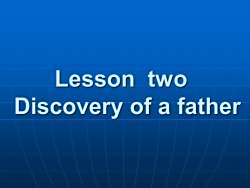
Lesson twoDiscovery of a father
Lesson two Discovery of a father

About the authorSherwood Anderson was born into a poor family inCamden,Ohio,theU.S.in 1867,but spenthisformative years in the town of Clyde, Ohio, whichinspired the setting of many of his stories.He workedasa laborer in1896-1898,then served intheSpanishAmerican War. He was theauthor of many storiesandnovels,andhe was a major influence on a youngergeneration of important writers,including Faukner,Hemingway,Wolfe,Steinbeck,and others,boththrough his writings and his acts of personal kindnessIt was through his influence, for example,that thefirstbook of both Faukner and Hemingway werepublished
About the author Sherwood Anderson was born into a poor family in Camden, Ohio, the U.S. in 1867, but spent his formative years in the town of Clyde, Ohio, which inspired the setting of many of his stories. He worked as a laborer in 1896-1898, then served in the Spanish American War. He was the author of many stories and novels, and he was a major influence on a younger generation of important writers, including Faukner, Hemingway, Wolfe, Steinbeck, and others, both through his writings and his acts of personal kindness. It was through his influence, for example, that the first book of both Faukner and Hemingway were published
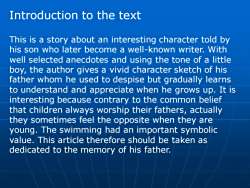
Introduction to the textThis is a story about an interesting character told byhis son who later become a well-known writer.Withwell selected anecdotes and using the tone of a littleboy, the author gives a vivid character sketch of hisfather whom he used to despise but gradually learnsto understand and appreciate when he grows up. It isinteresting because contrary to the common beliefthat children always worship their fathers,actuallythey sometimes feel the opposite when they areyoung.The swimming had an important symbolicvalue.This article therefore should be taken asdedicated tothememoryof hisfather
Introduction to the text This is a story about an interesting character told by his son who later become a well-known writer. With well selected anecdotes and using the tone of a little boy, the author gives a vivid character sketch of his father whom he used to despise but gradually learns to understand and appreciate when he grows up. It is interesting because contrary to the common belief that children always worship their fathers, actually they sometimes feel the opposite when they are young. The swimming had an important symbolic value. This article therefore should be taken as dedicated to the memory of his father
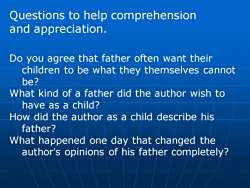
Questionsto help comprehensionandappreciation.Do you agree that father often want theirchildren to be what they themselves cannotbe?What kind of a father did the author wish tohaveas a child?How did the author asachild describe hisfather?What happened one day that changed theauthor's opinions of his father completely?
Questions to help comprehension and appreciation. Do you agree that father often want their children to be what they themselves cannot be? What kind of a father did the author wish to have as a child? How did the author as a child describe his father? What happened one day that changed the author’s opinions of his father completely?

Word studycreditdelayedpaymente.g. He bought this car on creditb)praisee.g. Wemust give her credit for our discovery.C) sth.That can bringhonor or pride to sb.e.g. These students are a credit to our school.d) recognition for a successfully completedcourse at the universitye.g. This course gives three credit points
Word study credit delayed payment e.g. He bought this car on credit b) praise e.g. We must give her credit for our discovery. c) sth. That can bring honor or pride to sb. e.g. These students are a credit to our school. d) recognition for a successfully completed course at the university e.g. This course gives three credit points

2) to sympathize (with) : to feel sorry for sbbecause you understand their problemse.g.Manypeople sympathized with the womanbecause her husband really was abrute.Sympathye.g.I have mo sympathy for thosepeopleTheydeserve their punishment.Sympathetice.g.She was very sympathetic to those poorkids who were unable to go to school
2) to sympathize (with) : to feel sorry for sb. because you understand their problems e.g. Many people sympathized with the woman because her husband really was a brute. Sympathy e.g. I have mo sympathy for those people. They deserve their punishment. Sympathetic e.g. She was very sympathetic to those poor kids who were unable to go to school

3) just the same(= all the same): in spite ofa particular situation or opinion etc, e.g.We don't need any more money. But thankyoujust the same.You are my only brother, but I can't let youbreakthelaw just the same
3) just the same(= all the same): in spite of a particular situation or opinion etc, e.g. We don’t need any more money. But thank you just the same. You are my only brother, but I can’t let you break the law just the same

to get sth. Up: to arrange or organize sth.e.g. We are getting up a party for her birthday.5)to be intimate with:to be extremely close toe.g.We are not intimate witheach other,butwe seeeachotherfairly often.6to get hold of:to finde.g.Make sure your friends know wheretoget hold of you.7to strike out: to move in a vigorous anddetermined waye.g.He struck out strongly for the shore.8)up to sth.:occupied or busy withsthe.g. He is up to no good
to get sth. Up: to arrange or organize sth. e.g. We are getting up a party for her birthday. 5) to be intimate with: to be extremely close to e.g. We are not intimate with each other , but we see each other fairly often. 6) to get hold of: to find e.g. Make sure your friends know where to get hold of you. 7) to strike out: to move in a vigorous and determined way e.g. He struck out strongly for the shore. 8) up to sth.: occupied or busy with sth. e.g. He is up to no good
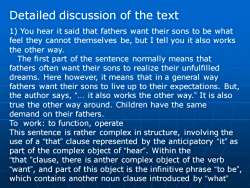
Detailed discussion of the text1) You hear it said that fathers want their sons to be whatfeel they cannot themselves be,but I tell you it also worksthe other way.The first part of the sentence normally means thatfathers often want their sons to realize their unfulfilleddreams. Here however, it means that in a general wayfathers want their sons to live up to their expectations.But,the author says,“... it also works the other way."It is alsotrue the other way around.Children have the samedemand ontheirfathers.To work:to function,operateThis sentence is rather complex in structure,involving theuse of a“that"clause represented by the anticipatory"it"aspart of the complex object of“hear". Within the"that"clause, there is anther complex object of the verb"want",and part of this objectis the infinitive phrase"to be”which containsanother noun clause introduced by"what
Detailed discussion of the text 1) You hear it said that fathers want their sons to be what feel they cannot themselves be, but I tell you it also works the other way. The first part of the sentence normally means that fathers often want their sons to realize their unfulfilled dreams. Here however, it means that in a general way fathers want their sons to live up to their expectations. But, the author says, “. it also works the other way.” It is also true the other way around. Children have the same demand on their fathers. To work: to function, operate This sentence is rather complex in structure, involving the use of a “that” clause represented by the anticipatory “it” as part of the complex object of “hear”. Within the “that ”clause, there is anther complex object of the verb “want”, and part of this object is the infinitive phrase “to be” , which contains another noun clause introduced by “what
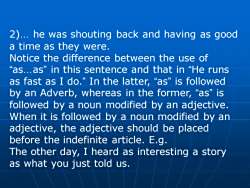
2)... he was shouting back and having as gooda time as they were.Notice the difference between the use of"as...as" in this sentence and that in "He runsas fast as I do." In the latter,“as” is followedby an Adverb,whereas in the former,“as”isfollowed by anoun modifiedby an adjective.Whenit is followed by anoun modifiedby anadjective,the adjective shouldbe placedbefore the indefinite article. E.g.The other day, I heardas interesting a storyas what you just told us
2). he was shouting back and having as good a time as they were. Notice the difference between the use of “as.as” in this sentence and that in “He runs as fast as I do.” In the latter, “as” is followed by an Adverb, whereas in the former, “as” is followed by a noun modified by an adjective. When it is followed by a noun modified by an adjective, the adjective should be placed before the indefinite article. E.g. The other day, I heard as interesting a story as what you just told us
按次数下载不扣除下载券;
注册用户24小时内重复下载只扣除一次;
顺序:VIP每日次数-->可用次数-->下载券;
- 《大学基础英语》课程PPT教学课件(三)Lesson 01 your college years.ppt
- 《大学基础英语》课程PPT教学课件(三)Lesson 06 Twelve Angry Men(Part Two).ppt
- 《大学基础英语》课程PPT教学课件(三)Lesson 05 Twelve Angry Men(Part One).ppt
- 《大学基础英语》课程PPT教学课件(三)Lesson 07 The Rivals Martin Armstrong.ppt
- 《大学基础英语》课程PPT教学课件(三)Lesson 08 We’re Only Human Laura Schlessinger.ppt
- 《大学基础英语》课程PPT教学课件(二)Lesson Two Maheegun My Brother.ppt
- 《大学基础英语》课程PPT教学课件(二)Lesson One Another Schol Year- What For?.ppt
- 《大学基础英语》课程PPT教学课件(二)Lesson four The Nightingale and the Rose.ppt
- 《大学基础英语》课程PPT教学课件(二)Lesson Five Say Yes.ppt
- 《大学基础英语》课程PPT教学课件(二)Lesson Seven The Greatest Invention.ppt
- 《大学基础英语》课程PPT教学课件(二)Lesson Ten The Richer, the Poorer.ppt
- 《大学基础英语》课程PPT教学课件(二)Lesson Eleven You Have To Get Me Out Of Here.ppt
- 《大学基础英语》课程PPT教学课件(二)Lesson Nine Quick Fix Society.ppt
- 《大学基础英语》课程PPT教学课件(一)Lesson 2 Going Home.ppt
- 《大学基础英语》课程PPT教学课件(一)Lesson one Half A Day.ppt
- 《大学基础英语》课程PPT教学课件(一)Lesson Three Message of the Land.ppt
- 《大学基础英语》课程PPT教学课件(一)Lesson 8 My Personal Manager.ppt
- 《大学基础英语》课程PPT教学课件(一)Lesson 5 Angels on a Pin.ppt
- 《大学基础英语》课程PPT教学课件(一)Lesson 7 Mandela's Garden.ppt
- 《大学基础英语》课程PPT教学课件(一)Lesson 11 The Midnight Visitor.ppt
- 《大学基础英语》课程PPT教学课件(三)Lesson 03 Michael Dell’s Two-Billion-Dollar Dream.ppt
- 《大学基础英语》课程PPT教学课件(三)Lesson 04 Wisdom of Bear Wood Michael Welzenbach.ppt
- 《大学基础英语》课程PPT教学课件(四)Lesson Seven Spring Sowing.ppt
- 《大学基础英语》课程PPT教学课件(四)Lesson Five Man of the Moment.ppt
- 《大学基础英语》课程PPT教学课件(四)Lesson Nine The Most Dangerous Game.ppt
- 《大学基础英语》课程PPT教学课件(四)Lesson Four A Drink in the Passage.ppt
- 《大学基础英语》课程PPT教学课件(四)Lesson three Why Historians Disagree.ppt
- 《大学基础英语》课程PPT教学课件(四)Lesson Two Waiting for the Police.ppt
- 《大学基础英语》课程PPT教学课件(四)Lesson One Thinking as a Hobby.ppt
- 《大学英语》课程教学资源(参考资料)大学英语四级听力应试技巧汇编.doc
- 《大学英语》课程教学资源(参考资料)大学英语四级考试思考.doc
- 《大学英语》课程教学资源(教案讲义)新视野大学英语(1/4).doc
- 《大学英语》课程教学资源(教案讲义)新视野大学英语(2/4).doc
- 《大学英语》课程教学资源(教案讲义)新视野大学英语(3/4).doc
- 《大学英语》课程教学资源(教案讲义)新视野大学英语(4/4).doc
- 《大学英语》课程教学资源(参考资料)四级英语考试英译汉必备知识.ppt
- 《大学英语》课程教学资源(参考资料)大学英语四级写作备课指南.doc
- 《大学英语》课程教学资源(参考资料)英汉翻译——翻译理论与实践.ppt
- 《大学英语》课程参考资料(作文写作)keys to writing.doc
- 《大学英语》课程参考资料(作文写作)作文模式.doc
